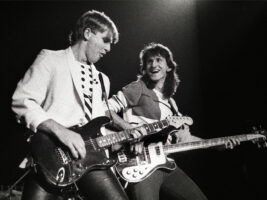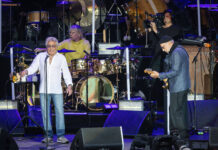
“We went from playing high school dances once or twice a month to playing six nights a week”: Alex Lifeson on how Rush’s career took off with this one change
Alex Lifeson has revealed how an unexpected change in provincial law had led to Rush’s career taking off overnight in the early ’70s.
Speaking on a recent episode of Q with Tom Power, the Rush guitarist shares a pivotal moment for the band in 1971, right around the time the group was transitioning from a four-piece to the now-iconic power trio of Lifeson, Geddy Lee, and drummer John Rutsey.
READ MORE: “We have talked at length about this”: Alex Lifeson is contemplating touring and playing live again – but not with Rush
“So in 1971, the Ontario government lowered the drinking age from 21 to 18,” Lifeson explains. “That was the year that we just turned 18. And we went from playing high school dances once, maybe twice a month if we were lucky, to playing six nights a week and some matinees on Saturdays. For week after week after week.”
“I mean, all those clubs popped up: the Abbey Road, Piccadilly Tube, Gas Works, Larry’s Hideaway. So you went from playing a week at one place to a week at another to another. You constantly played. And that’s really so important in the early stages. You’re learning your stuff.”
Alongside gigging nonstop, Lifeson says that the band was equally committed to crafting original music: “We spent a lot of time writing music every chance we had. We did all that stuff. And we were very dedicated to what we were doing.”
“I really had a belief in myself: if this music thing doesn’t work out, well then I’ll do something else,” he adds. “I’ll work with my dad as a plumber’s assistant or whatever but I really believed that this was going to work out. I never worried about it in the early days.”
Elsewhere in the interview, Lifeson also speaks about the creative process behind Stygian Waves, the second album from his rock project Envy of None.
While their debut album sought to reshape the role of guitar entirely (“I wanted to get away from hearing a guitar as a guitar and create and manipulate the guitar as a sort of neutral instrument that creates all these different textures and colours,” Lifeson says), the new record takes a slightly more conventional approach.
“With this second album we’ve gone a little different. I think it’s because we feel now we’re more of a unit — like a band — rather than four individuals working to make records. So yeah, the guitar has a little more of a traditional presence overall but still, I get to do that fun stuff.”
Still, when it comes to guitar solos, Lifeson says it’s not about showing off: “I tend to stay away from that because I don’t want solos to seem like they’re just a flash showmanship thing. I believe that a solo really requires some thought in its construction… it has to be in service of the song.”
“I was reluctant even in Rush towards the end, I was not playing nearly as many solos,” says the guitarist.
The post “We went from playing high school dances once or twice a month to playing six nights a week”: Alex Lifeson on how Rush’s career took off with this one change appeared first on Guitar.com | All Things Guitar.
Source: www.guitar-bass.net











